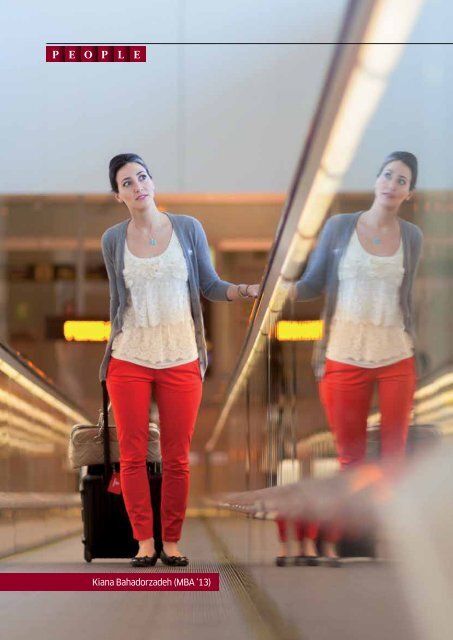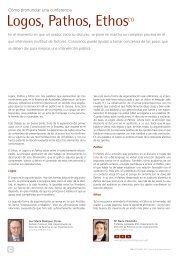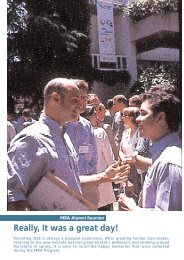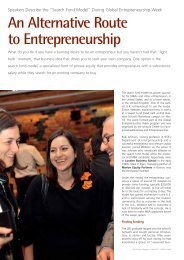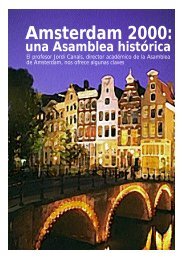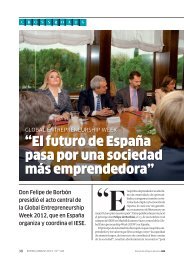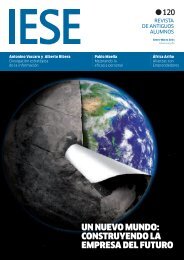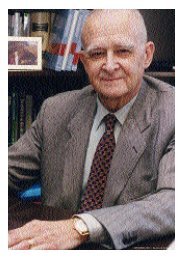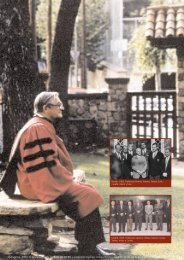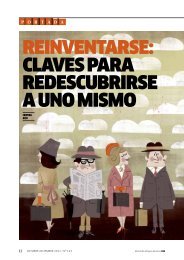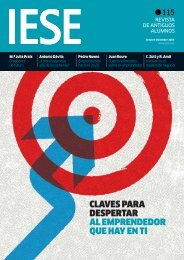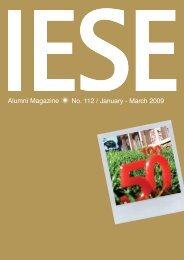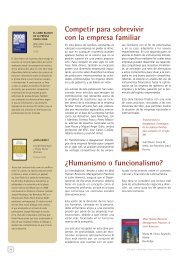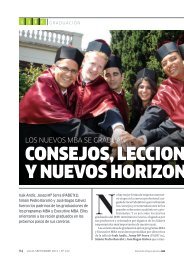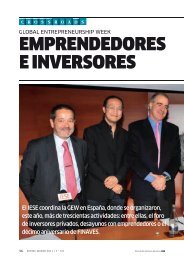P E O P L E
P E O P L E
P E O P L E
- No tags were found...
Create successful ePaper yourself
Turn your PDF publications into a flip-book with our unique Google optimized e-Paper software.
P E O P L EKiana Bahadorzadeh (MBA ‘13)44 JULY-SEPTEMBER 2013 / No. 130Alumni Magazine IESE
2013 MBA GRADUATESTRAVELBROADENSTHE MINDSTEPHEN BURGENEDU FERRER ALCOVERKiana Bahadorzadeh, MasayukiManabe, Joan Xiol, Ágata Lozano,Eghosa Oriaikhi and NatheerMasarweh are six of thestudents who have graduatedfrom IESE’s Masters programsthis year. Each of these outstandingstudents was given theopportunity of a lifetime in the shape of an internationalcomponent to the course, organized by IESE. These moduleswere to take them, variously, to Shanghai, São Paulo,Nairobi, New York and Silicon Valley.MBAKIANA BAHADORZADEHMODULES: SAO PAULO & SHANGHAIFounder and joint CEO of U.S. tableware company KiyasaCorporation.lKiana Bahadorzadeh was born in Iran and moved to theUnited States when she was 20, where she studied hospitalityadministration at Boston University. After working forBritish Airways and a lifestyle management club she went onto found the Kiyasa Corporation with her sister in 2009. Thecompany distributes luxury tabletop and home decor.“A lot of top schools don’t offer an intensive exchangeprogram. Having the two-week option of living in a differentcountry is a perfect combination of getting a taste forit, doing some classes and a bit of networking. For me personally,the classes in Sao Paulo were more interesting thanthose in Shanghai, partly because I’m looking to relocate toLatin America. It’s been beyond my expectations. I didn’texpect the school to be so international. Most schools inthe U.S. are about 20 percent international so I thoughtthat was what it would be like here. In a class of 65 we didn’thave more than four people of any one nationality. WhatIESE offers is a really nice balance between finance and industryclasses, with more soft skills. I’m going to Sao Pauloin August. I started a company with my sister and we wantto expand into Latin America.I imagine that what I’m going to encounter in Brazil willbe very similar to Iran in terms of bureaucracy, gettingthings done, corruption and so on. It was so easy for us toget started in the U.S. Within two weeks you can have a companyregistered. When I went to Sao Paulo I was remindedthat most of the world is not like the U.S.Business schools don’t necessarily have to adapt but theydo have to be real about it, and discuss real cases of companiesthat have had to go through these challenges and bringin speakers from those regions. They should teach peoplethat this is how things are in most parts of the world so youbetter be ready for it. Because IESE is so international, whenyou sit down with your fellow students you get perspectivesfrom all over the world.”Alumni Magazine IESE JULY-SEPTEMBER 2013 / No. 130 45
P E O P L EMasayuki Manabe (MBA ‘13)MBAMASAYUKI MANABEMODULES: SAO PAULO AND NAIROBIFourth generation of family marine engineering businessManabe Zoki Co., Ltd.lMasayuki Manabe was born in Japan and studied economicsand engineering at Kyoto University. After finishinghis studies, he worked for a while as an IT consultant,and then joined the family marine engineering business. “Ihad no experience of living abroad and I wanted to get toknow other cultures. My family business is in marine engineeringand our products are sold all over the world, soI was glad of the chance to understand how things workelsewhere.In Japan we tend to be highly disciplined and follow rulesand we are not good at directly expressing our opinions. Tome the way things are done in Nairobi seemed chaotic. Inmeetings people expressed opinions which did not seemrelevant to what had just been discussed, and were more argumentative.To me it looked like fighting, and seemed disorganized.Now, however, I understand that this stems fromcultural differences. Japanese people will have a discussion,paying attention to the opinion of others, while people herewill give their opinion first and then hold the discussion.When I came to IESE, my priority was to learn about thingslike operations and accounting but now I see that experiencingdifferent situations is also important. When I go back, I7WHEN I CAME TO IESE,MY PRIORITY WASTO LEARN ABOUT THINGSLIKE OPERATIONS ANDACCOUNTING BUT NOWI SEE THAT EXPERIENCINGDIFFERENT SITUATIONSIS ALSO IMPORTANTMasayuki Manabewill be in charge of new business development, mainly overseas,and my experience in Sao Paulo and Nairobi will help.Before I came here I struggled to speak my mind, but peopleat IESE understood that and they encouraged me andnow I try to be more open. Someone from the West comingto work in Japan would find it difficult to understand ourcommunication style. They wouldn’t understand what weare thinking. In Japan you have to understand what peopleare thinking, although they don’t say anything.”46 JULY-SEPTEMBER 2013 / No. 130Alumni Magazine IESE
EMBAÁGATA LOZANOMODULE: NEW YORK & SHANGHAIAssistant to Managing Director of bulk wine division atwine company Bodegas Lozano.Ágata Lozano’s life has always been linked to thel business her family has run for four generations inthe La Mancha region of Spain. Although she has alwaysbeen at liberty to choose her own path, she says that asense of vocation, combined with sentimental attachment,led to her decision to carry on the family tradition.She studied business administration and judicialand business law in Madrid and Dublin.Her career began as soon as she graduated, and sheworked in every department of the organization, endingup in the department of finance and exports in a businessthat now conducts 95 percent of its commercial activityoverseas.After a decade in the company, she felt the need forsomething new. “I said to myself: now what? I knew a lotabout my sector but practically nothing about other industries.Before I decided to join the program I studiedit in depth and saw that it could broaden my outlook andteach me about cases and problems similar to my own.The IESE EMBA offered me this perspective as well as ahuge number of tools, not to mention the prestige thatcomes from attending a school that has spent 50 yearstraining top executives.”In March 2013 the EMBA program at the IESE Madridcampus held a one-week intensive module at CEIBSbusiness school in Shanghai, to give the participants acloser look at the Chinese business and sociopoliticalcontext. For Lozano, the most interesting aspects ofthe module were the sessions and the contact with localpeople. “We got some sense of the reality of the country;the geopolitical, cultural and economic aspects as wellas the business milieu. I now have a greater understandingof the differences, because they work in a differentway,” Lozano says.“Because of my job and our expansion in Asia I’veworked with China for many years, but I now realizethat I have a better idea of who they are and how theythink, understand and behave.” In the West we are moreproactive, we always try to look ahead and we reason ina linear fashion. By contrast, in the East they are morereactive and their manner of reasoning and reflectionis more circular. Seeing and understanding these differencesis a fundamental lesson in life for any executivewho wants to expand their business. Understandinghow things function in a given milieu, how they aredone, how they breathe, all this is fundamental beforemoving into it yourself,” she says.“It’s been a profoundly enriching experience whichhas given me a lot of food for thought, and I’m surethat in the future it will be extremely useful for ourbusiness.”Ágata Lozano (EMBA ‘13)Alumni Magazine IESE JULY-SEPTEMBER 2013 / No. 130 47
P E O P L E7THE GREAT THING ABOUT THIS PROGRAM ISTHAT YOU ARE ABLE TO APPLY IT TO YOURDAY-TO-DAY WORK WHILE YOU ARE STUDYING,AND YOU ALSO DEVELOP AN ENORMOUSNETWORK OF CONTACTS. I CAN USE THESE NOWAND THEY WILL CERTAINLY GIVE RISE TO MANYOPPORTUNITIES IN THE FUTUREJoan XiolEMBAJOAN XIOLMODULES: NEW YORK & SHANGHAIBusiness development manager at skin care companyMussvital.lJoan Xiol, from Barcelona, is only 29 but has alreadycompleted a degree in telecommunicationsengineering, studied at three business schools, workedfor a variety of companies, launched and sold his ownstart-up, undertaken the EMBA program and got married.All of this, he claims, because he’s a bad engineer.“The truth is I’ve always seen myself as a bad engineerfrom a purely technical point of view,” he says. “Aftercompleting my degree in Paris I worked for about a yearin I+D at Alcatel but I had to face the fact that I didn’tenjoy it. I decided to realign my career toward managementand business while still staying in some way relatedto technology and engineering because I was stillvery interested in those fields.”In 2005, he had the idea of developing an identificationmechanism using radio frequencies, which couldbe applied to many processes in a range of sectors. Thisembryonic idea gave rise to a business plan and then thestart-up Aifos Solutions, which targeted this technologyon the managementof blood banks. “The Aifos experiencewas very enriching but we received a good offer anddecided to sell the business. After that I decided I neededto complete my education with a deeper, more global andmore rigorous program. It had to be in Barcelona to fit inwith my personal life and my current job at Mussvital.”He had no doubt that “the EMBA was the best option,”and said that during the second course he became moreinvolved in the sessions, case studies, the faculty’s businessexperience, the support of fellow students and thespecial modules, such as the trip to the New York center.“It was very intense and enriching. It was structuredaround three areas: finance, globalization and entertainment.The finance part made a powerful impact on me—and I was surprised to find myself attracted to a subjectthat’s never called to me—and so did the entertainmentpart, because it’s a spectacular sector that has always appealedto me,” says Xiol.“Furthermore, it was very interesting to see the facilitiesand day-to-day operations of Citibank, Disney andChristie’s firsthand. When you see it firsthand you realizethat the U.S. business focus is very different. They arevery direct and aggressive and have clear ideas. It’s part oftheir culture and it works, because it is the most powerfulnation on earth. Besides that, I really appreciated the opportunityto establish contact with American professionals.At a more personal level it’s great to leave home andbreathe in a completely different professional culture. Ithink this is a fundamental part of the program.”After so much movement and change, Xiol jokes thatafter the EMBA he’s never going to study again—“or notfor some years,” he says. “I believe I’ve acquired a verybroad education which will really contribute to my development.I will certainly try to set up more businesses infuture because it interests me and because, after this timeI’ve spent at IESE, I will have even more opportunities.The great thing about this program is that you are able toapply it to your day-to-day work while you are studying,and you also develop an enormous network of contacts.I can use these now and they will certainly give rise tomany opportunities in the future.”48 JULY-SEPTEMBER 2013 / No. 130Alumni Magazine IESE
P E O P L EEghosa Oriaikhi (GEMBA ‘13)GEMBAEGHOSA ORIAIKHIMODULE: SHANGHAIField Service Manager at Schlumberger Oilfield Servicesin Louisiana, U.S.A.lNigerian Eghosa Oriaikhi is a British citizen who studiedmechanical engineering at University College Londonand has worked in the oil and gas industry ever since.She is a member of the Society of Women Engineeers andthe Initiative for the Advancement of Education in Africa.She currently works for Schlumberger Oilfield Services inthe Gulf of Mexico.“I could have done an MBA program in the U.S.A. but thechance to go to school in Spain, learn about a new country,its culture and language, and, most of all, to be able to takethe MBA modules in different places, was the deciding factorfor me in choosing IESE. For me the academic rigor hasbeen excellent and very demanding.There is a big difference between reading books aboutwhat it’s like to work and do business in China, and havingthe chance to study there for two weeks, spend time with aChinese family, interact with the society and experience thebusiness forces there.One of the things I enjoyed most was the national, cultural,language and life experience diversity of my class. Thelevel of closeness and friendship that we have built forms alifelong network of business support. I would also highlightthe dedication of the professors, not only to our academic7ONE OF THE THINGSI ENJOYED MOSTWAS THE NATIONAL,CULTURAL, LANGUAGEAND LIFE EXPERIENCEDIVERSITY OF MY CLASSEghosa Oriaikhigrowth, but also to our personal growth as business leadersand individuals. One of the courses I found most interestingwas the one on managing oneself, where we learned tofind the best in ourselves and to improve in all aspects to bethe best members of society and business leaders we could.I chose IESE because it genuinely cares. There is a feelingthat you are with family while you are learning. With thatfeeling came an openness to try and stretch my knowledgeand understanding—knowing that I have the support system.I am working on changing industries, from oil and gasto private equity and venture capital, in mobile and Internettechnology-focused industries that can have an influence onthe development of Africa.”50 JULY-SEPTEMBER 2013 / No. 130Alumni Magazine IESE
Natheer Masarweh (GEMBA ‘13)GEMBANATHEER MASARWEHMODULE: SILICON VALLEYVice President of Quality Global Injectables at HikmaPharmaceuticals.lNatheer Masarweh graduated in Chemistry at theUniversity of Jordan and continued his training witha Master’s degree in Medicinal Chemistry at Sussex University,and another in Industrial Pharmaceutical Sciencesat Manchester University. After joining Hikma Pharmaceuticalsin 1993, and undertaking various positions atthe company, in 2012 he became Vice President of QualityGlobal Injectables.“The decision to join the GEMBA at IESE was mainlybased on the fact that the course is run on different campuseson different continents. I was looking for a coursethat would expand my multicultural horizon and increasemy global comprehension of the business world. What I especiallyliked was the link between theory and practice thatmade things make more sense from a business perspective.It was interesting that the teaching methodology wasbased on a selection of case studies relevant to differentbusiness environments. Furthermore, the approach of thecourse and the way the different modules were connectedto each other was very appealing to me. The programs firstlaid down the foundation of forming a business, then providedguidance in improving business performance froman operational standpoint, then how to grow the business7THE GEMBA EXPERIENCETEACHES YOU TO BE AGOOD LISTENER, NOT TOJUDGE UNTIL ALL THE FACTSARE PRESENTED AND HOWTO BE MORE TOLERANTNatheer Masarwehthrough driving innovation, and then on how creating andmanaging innovation sustains businesses.Overall, the program adds a different flavor when comparedto the traditional programs, as it provides the propertools for executives to run their business efficiently. It hasbeen an interesting and challenging 18 months. The courseindirectly teaches participants how to balance their job,family and social activities. My job requires me to lead amulticultural team and work across cultures. The GEMBAexperience teaches you to be a good listener, not to judgeuntil all the facts are presented and how to be more tolerant.Now I hope to leverage what I have learned and accomplishedin my new assignment.”Alumni Magazine IESE JULY-SEPTEMBER 2013 / No. 130 51


